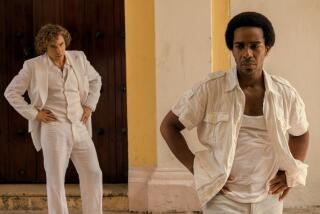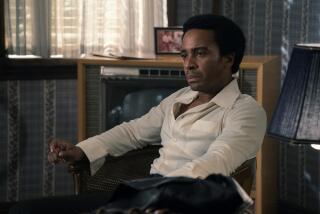Newton--a Struggle to Live Up to the Legend
- Share via
SAN FRANCISCO — From the moment Huey P. Newton was thrust onto the national stage after he was charged with killing an Oakland police officer in October, 1967, until his own death by gunfire there Tuesday morning, Huey Newton the man struggled constantly to live up to Huey Newton the legend.
“Here was a man who got swept up by a historical moment,” recalled Elaine Brown, who became Newton’s comrade and lover after he co-founded the Black Panther Party. She now works as a writer in Los Angeles.
“The ‘Free Huey’ movement that evolved from that incident made him larger than life,” Brown said. “Suddenly, he was forced to play the role of the revolutionary hero.”
To outsiders, it is a role that Newton appeared to play with gusto, brandishing weapons, wearing his black beret and leather jacket, clenching his fist in the Black Power salute. But Newton’s friends and associates said Tuesday that pressures associated with the role led to repeated clashes with police and may have accelerated his descent into the cocaine addiction that many of them assume ended up destroying him.
Political Philosophy
In any case, they said, Newton would be remembered for his political vision more than for his later personal troubles and his violent end. He was shot in the head early Tuesday morning on a crack-infested Oakland street.
“He helped set the stage for what now seems the routine elections of blacks and other minorities to political office,” said Rep. Ron Dellums (D-Oakland). “The Black Panther Party that he helped to found and which he led for many years represented a significant stage in the development of the movement for black political empowerment.”
“I remember him as a fighter for equality, humanity, equality of races, the dignity of black Americans, and I idolized him during those periods of times,” added Charles Garry, Newton’s attorney.
“He withstood all kinds of adversity . . . and the FBI constantly harassed him to the point (where) they killed him from an emotional standpoint,” Garry added.
But to law enforcement officers, with whom Newton had clashed repeatedly, Newton all along was little more than a small-time gangster.
“My opinion is that he was no more than a thug,” said Tom Orloff, a deputy district attorney in Alameda County who prosecuted Newton in a 1974 assault case. “He acted out violently against other people and abused them. He didn’t do anything that was positive.”
Indeed, even some of those who admired Newton as a visionary who helped to channel the undirected black rage of the ‘60s into the struggle for justice and against police brutality said that Newton had a self-destructive streak.
“Ever since he came back from Cuba in 1977, he was kind of out of control and consistently managed to self-destruct,” said Dennis Riordan, an attorney to former Black Panther John Spain. Newton spent three years as a fugitive in Cuba after being charged with a series of violent crimes in 1974, including the fatal shooting of a 17-year-old girl.
“But you can’t just say that Huey Newton was just another criminal who came out of the ghetto,” added Riordan. “Lots of them did, but few of them transformed national politics.”
In any case, “nobody is terribly surprised he died a violent death,” Riordan said.
“No matter what accusations are made against him, he is still my friend and my brother,” said the Rev. Cecil Williams of Glide Memorial Church in San Francisco, who rushed to Oakland Tuesday morning to comfort Newton’s wife and family.
Ironically, the Black Panthers achieved their greatest political success while Newton was in Cuba and Elaine Brown was running the organization.
“He was a leader and theoretician, but he wasn’t an administrator,” Brown said Tuesday.
Newton had emerged as a national figure in the mid-1960s after he and another well-known comrade, Bobby Seale, co-founded the Black Panther Party. On Oct. 28, 1967, Newton began the first of many major encounters with the law when he was involved in a shoot-out with Oakland police and was charged with murder in the death of Officer John Frey.
Newton’s trial was held the next year under ultra-tight security at the Alameda County Courthouse in a courtroom jam-packed with spectators and news reporters from around the country.
The prosecutor was an assistant district attorney, D. Lowell Jensen, who later became the county’s top prosecutor, then went to Washington to serve as an assistant to Atty. Gen. Edwin Meese III and who now is a federal district judge in San Francisco.
The defense attorney was Garry, a San Francisco lawyer who was to gain fame as a zealous and impassioned defender of the Panthers and countless other radicals of the day who ended up in court.
When the case went to the jury, Oakland braced for what it feared could be an explosive response in the black community if Newton were to be convicted.
Cities around the nation already had erupted into the violence that marked the riot-torn ‘60s--and many feared the worst was yet to come in Oakland. As it turned out, the jurors did find Newton guilty--but of a lesser offense that many interpreted as a victory for Newton: voluntary manslaughter.
Newton was sentenced to from two to 15 years in prison, but his conviction was overturned by a state Court of Appeal on grounds that the jury was not properly instructed.
In 1970, after spending 22 months in prison, Newton was released on $50,000 bail pending retrial as hundreds of his supporters cheered his new-won freedom, chanting “Huey! Huey!”
As he left the courthouse, Newton thrust his fist into the air and shouted the Panthers’ by-now-familiar slogan, “Power to the People!” Ultimately, the charges in the officer’s death were dropped after two subsequent mistrials.
Newton once again found himself in serious trouble with the law in 1974 when he was charged with pistol-whipping his tailor and murdering a 17-year-old prostitute. But the murder and assault charges were later dropped after juries in the cases deadlocked. He was found guilty in 1978 of the charge of being a felon in possession of a handgun.
In 1980, after a series of further brushes with the law, Newton found himself in a different sort of controversy when, after three years as a graduate student, he was awarded a doctorate of philosophy degree from UC Santa Cruz in history of consciousness, described as an interdisciplinary program on the history of social philosophy.
Newton’s doctoral dissertation, reviewed and accepted by a panel of three faculty members, was entitled, “War Against the Panthers: A Study of Repression in America.”
A university spokeswoman said Newton’s study program involved “the history of humanity’s different cultural organizations and expressions and the analysis of fundamental ideas of human nature, society and community that form social custom.”
The degree drew letters of protest to UC Santa Cruz officials, who in turn defended Newton and the program under which he studied. “Mr. Newton was a serious and diligent student in his course work and his thesis research,” said Chancellor Robert L. Sinsheimer. “This program is not only legitimate, but it is also of rather longstanding as an interdisciplinary program.”
Times researcher Norma Kaufman in San Francisco contributed to this story.
More to Read
The biggest entertainment stories
Get our big stories about Hollywood, film, television, music, arts, culture and more right in your inbox as soon as they publish.
You may occasionally receive promotional content from the Los Angeles Times.










